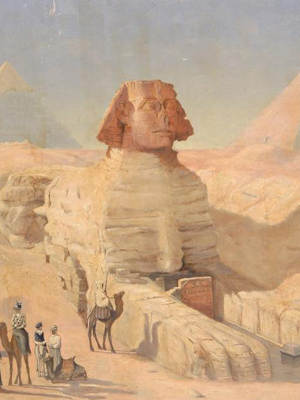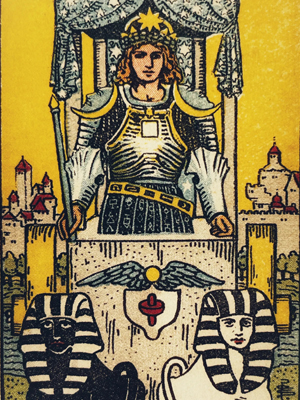
Masonic Articles and Essays
Deciphering the Sphinx From a Masonic Perspective
Very Ills..... Bro. Pamela McDown 33°
Date Published: 1/17/2024
The Sphinx of ancient Egypt laid buried beneath the sands for centuries after the fall of the mighty dynasties who built them. Discovered once again in the Napoleonic age, they have surfaced once more to speak their silent secrets. What hidden wisdom can the Freemason derive from their study?
 What animal has four legs in the morning two at noon, and three at night?
What animal has four legs in the morning two at noon, and three at night?
The Sphinx poses this riddle in the play Oedipus Rex by Sophocles. The clever King Oedipus guessed the answer. It's a human being, who crawls when a baby, stands on two legs as an adult, and walks with a stick in old age. The riddle made me contemplate the rather sobering journey of human existence.
For thousands of years, the Egyptian Mystery School used the symbol of the Sphinx to denote certain qualities of "perfected humans", super-developed beings, adepts, and holy masters. Even today, the Sphinx remains one of the most mysterious symbols of antiquity. It is found in multiple cultures, including the Egyptian, Greek, Assyrian, Persian, and Zoroastrian, and is written about in the Bible in the Book of Ezekiel. The Sphinx is a mythical creature commonly portrayed with the head of a human, the body of a bull, the paws of a lion, and the wings of an eagle. In Royal Arch Masonry, these are displayed as the Four Living Creatures. The Sphinx is often placed on the pillars of a Temple as the guardian and the model upon which searchers for light must base the construction of their character.
Sphinxes are enigmatic and inscrutable. How does a Freemason decipher their mystery? Can its Wisdom lead the seeker on a path to perfection?
According to the book "A Treatise on White Magic" by Brother Alice Bailey, there is an important message about the Sphinx written on the Halls of Initiation which she writes about as follows:
"'To will, to know, to dare, and to be silent' has a special significance not hitherto revealed and at which it is only possible for me to hint. Those of you who have the inner knowledge will comprehend at once."
This statement definitely sparked my curiosity. What does it mean? Let's take one phrase at a time to then speculate on the conjoined significance.
To Will is represented by the body of a bull. It means to have determination and perseverance. Our life Purpose is intimately related to our Will power which produces action. To be skilled in the craft of Freemasonry, it requires study and practice and hard labor. It takes courage to look outside to what is needed for the greater good and the evolution of mankind. To be like a bull is associated with Taurus and the element of Earth. Esoterically, these words relate to the unification of soul and the lower nature, and it concerns the chakra at the base of the spine.
To Know represents the head of a human and refers to the idea that the spiritual and Masonic journey is one of knowledge -- and that knowledge is never-ending. We are to seek the truth, no matter how difficult the search or the revelations may be. Most importantly, a Mason first learns to "Know Thyself" before the true path can be known. To be like the head of a human is associated with Aquarius, and the element of Air. Brother Alice Bailey relates "To Know" to the Ajna chakra and an esoteric hint lies in the words "Let the Mother know the Father."
To Dare represents the paws of the Lion. The lion is a symbol of courage. It can be interpreted as having the courage we need to grow spiritually. Fortitude is one of the four cardinal virtues of a Mason. The craftsman becomes familiar with fortitude and the Lion's paw at a certain stage of his journey. From the hand of a trusted brother, the candidate is raised to a higher level of spiritual understanding and with the strength so gained, moves into a realm far outside the terrestrial. To be like a lion is associated with Leo and the element of Fire. Esoterically, there is a connection with the solar plexus chakra, the clearing house of desire and astral forces.
To Be Silent is represented by the wings of the eagle. It seems like it should be an obvious one, but it's a bit more complex than it appears on the surface. To be certain, "to be silent" could mean to a Freemason that we need to never reveal the Masonic secrets. It also means that we need to learn the value of inner silence. It is a rare person indeed who recognizes that sometimes the unspoken is more important than the words we utter. To be like the wings of an eagle is associated with Scorpio and the element of Water. Esoterically, the phrase corresponds to the sacral chakra which needs to relapse into silence for the true creative work to take place.
My sense is that when the four esoteric maxims are mastered as a formula, we represent in truth the full manifestation of divine nature. A true Master is one who becomes a master of his own life and rules and governs the forces of his nature accordingly.
 Perfection is not only a philosophical concept but also an inherently Masonic principle. Within the divine creation, as humans we are reflections of the one divinity, facets of the one immortal Self. It is our destiny to actualize the talents that we have been endowed with. The candidate for each Masonic degree is granted a chance for introspection, to reflect upon his life lessons and how they have guided him along this road to perfection. Moreover, he is also asked to take vows and given an opportunity to recommit to his higher purpose. Perfection is a special human pursuit. Many of us seek it, but can it actually be attained? We may get closer but with a lot of mistakes.
Perfection is not only a philosophical concept but also an inherently Masonic principle. Within the divine creation, as humans we are reflections of the one divinity, facets of the one immortal Self. It is our destiny to actualize the talents that we have been endowed with. The candidate for each Masonic degree is granted a chance for introspection, to reflect upon his life lessons and how they have guided him along this road to perfection. Moreover, he is also asked to take vows and given an opportunity to recommit to his higher purpose. Perfection is a special human pursuit. Many of us seek it, but can it actually be attained? We may get closer but with a lot of mistakes.
This return to our original pristine state of Deity's creation is often likened to a refiner's fire. As we might ascertain the purity of gold by burning off impurities, so too, may we encounter our truest selves as we remove the obstacles in life. This rendering away of irregularities to recapture that which is pure and pristine, can be compared to the masterpiece of which every stone sculptor dreams. While the operative mason uses the mallet and chisel, the speculative mason engages in the refining process using the mind as a tool through study and an open exchange of ideas.
In the final analysis, I believe that Freemasons are called upon to pursue perfection because we can be enabled to improve not only ourselves but the entire world. What matters ultimately are not our collections of titles, experiences, regalia, or degrees. The Great Architect of the Universe simply desires that we rediscover the reason for our place on Earth. Why are we here? Whether we have four legs, three or two, it is for us to decisively act upon that sure knowledge that human existence has a purpose. The riddle of the Sphinx actually should jar one back to this humbling realization. Perhaps the greatest riddle of the Sphinx is the Sphinx itself. How do you decipher the riddle of the Sphinx?
